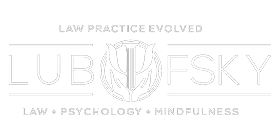Inherent in contemporary American jurisprudence is the notion of ultimate judgment. By its nature, our adversarial system ultimately adjudges one party “right,” and the other party “wrong,” or some variation on that theme. In contrast, mindfulness emphasizes the importance of letting go of the judging and comparing mind in favor of a non-dualistic connection to […]
In cultivating a heightened ability to dis-identify from conditioned thought and judgment and more meaningfully attend to present-moment experience, one can begin to sense the richness of life and the interconnectedness we share with all living beings. This felt sense of interconnectedness is a precursor of compassion towards all living things. In the context of […]
Most civil litigation whether divorce, employment, business-related, etc., involves at its core a claim by one party that the opposing party failed to conform his/her/its behavior to a certain expected standard of the aggrieved party. Since so much civil litigation involves parties with some preexisting level of familiarity with opposing parties, there is usually some […]
A casual analysis seems to reveal a correlation between unhappiness and legal difficulties. What is confounding, of course, is whether legal problems cause people to suffer and feel unhappy, or whether unhappy people are more prone to poor decision-making that ultimately results in legal conflict. Though this correlation – to some extent – likely runs […]
The fundamental difference between holistic law and more traditional law practice can be characterized as “What is happening?” versus “What happened?” In almost all types of civil litigation, including divorce, family law, personal injury, employment, etc., the launching point for traditional attorneys is to have the client articulate his or her cerebral recollection of a […]
When people find themselves ensnared in legal difficulties, these problems can often be traced to long-held conditioned thinking. These entrenched ideas about how life is or should be often serves as the precursor to behaviors directly resulting in the legal issue(s) now being faced. The quality of this conditioned thinking is such that, over time, […]
A holistic lawyer views legal “problems” within the infinitely broad context of the present moment. Traditional law practice places a primary focus on past events or future objectives and looks to man-made laws, regulations, and judicial opinions as providing the framework in which to remedy past “wrongs” or pursue articulated future outcomes. In contrast, holistic […]
America appears largely entrenched in an approach to life that emphasizes immediate remedies to unpleasant feelings and situations. Visit most physicians complaining of anxiety, sadness, or digestive problems and you are likely to leave with a prescription for some pharmaceutical remedy. If sitting in boredom wondering where one’s life is going, it is easy enough […]
Over the past few decades, the predominant structure of law firms in the United States has been a multi-tiered hierarchy that most highly compensates firm owners (or partners) at the top of the hierarchy who are successful in generating new clients for the firm. Most often, the business generated by these “rainmakers” is channeled down […]
The vast majority of legal problems share a common denominator: a sense that another has violated one’s sense of how things should be. If you are a party who believes you have been wronged, there may be a tendency to point towards the other as an example of the unfairness of life, or how others […]
